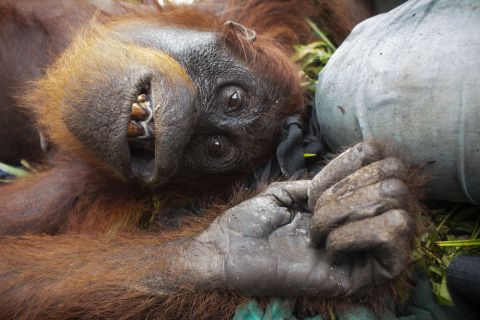
A mother and baby orangutan are the latest victims of forest fires to be rescued in West Borneo, while a large male that was with them was left behind until a later date.
After previously rescuing dozens of orangutans after fires in Ketapang Regency in 2019, our team, alongside the West Kalimantan Centre for Natural Resources Conservation (BKSDA) rescued the mother and baby from Sungai Pelang Village, Matan Hilir Selatan District on 2 February.
A local man called Purnomo reported the existence of the orangutans after they had been in the area in front of his house for the previous three days. According to his statement, they had fled from a forest fire. However, sadly their chosen place of refuge didn’t have enough food or shelter for them to survive.
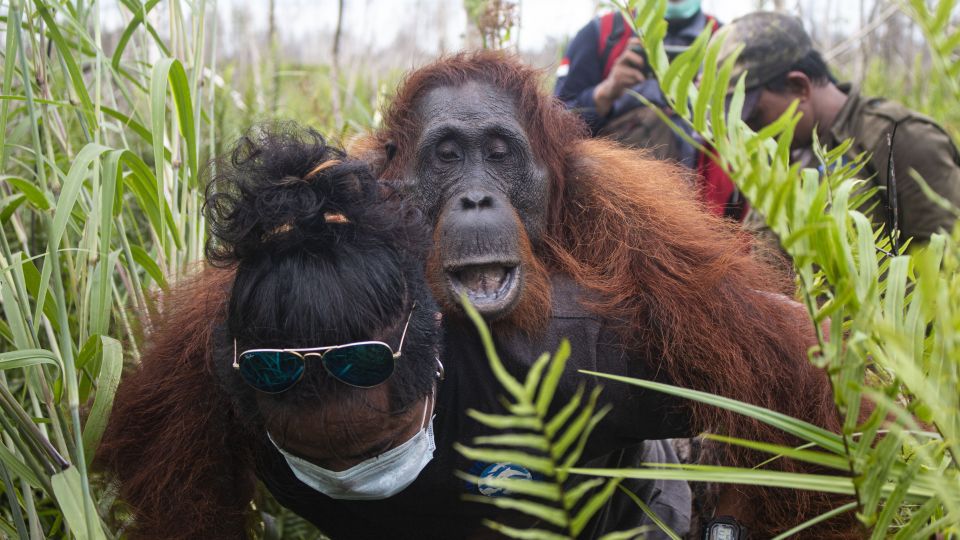
The rescue operation was carried out because the forest that had been home to the orangutans had been burned, leaving only scorched tree trunks and weeds growing up. It had only taken a few weeks for the forest to burn but it will take decades to restore it.
When our rescue team arrived, the team found the three orangutans, an adult male, an adult female and an infant of about three years old. They were surviving on dry tree bark. The rescue team focused on saving the mother and infant.
“We prioritised saving the mother and her baby because their condition was much more worrying than that of the male orangutan,” said Argitoe Ranting, IAR Manager of Surveys, Release and Monitoring, who lead the rescue activity. “The male orangutan is very wild and still quite strong. We think he will be able to survive for some time. Nevertheless, our Orangutan Protection Unit (OPU) will continue to patrol and monitor him,” he explained.
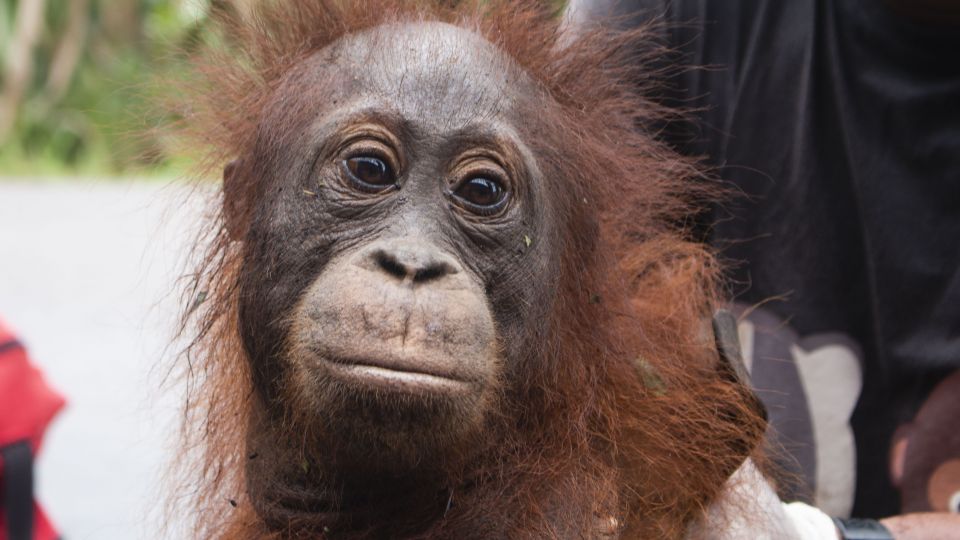
Our rescue team used a dart gun to anaesthetise the adult female. Once captured, a brief medical examination revealed that she was malnourished and extremely thin.
It looked as though she had been starving for months which is not surprising given the state of the forests after the fires in 2019. Monitoring from the air showed that there were no more suitable forests where these orangutans could live within a radius of several kilometres.
The mother and baby, named Mama Rawa and baby Rawa by our rescue team, were taken to our Orangutan Rehabilitation Centre in Sungai Awan, Ketapang to undergo further examination and treatment. Later, the two orangutans will be moved to a more suitable forest where they will have sufficient food and shelter to survive.
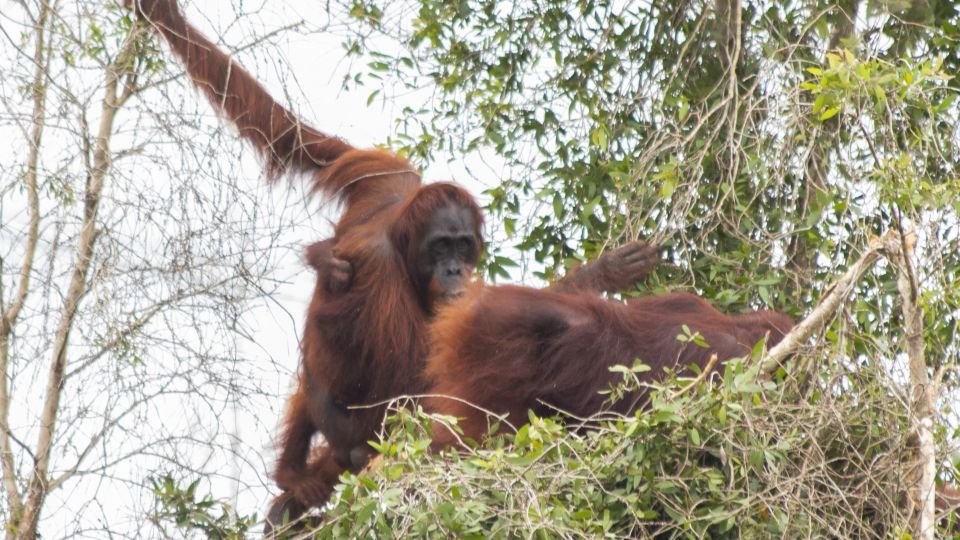
The area is still feeling the effects of large-scale forest fires during the dry season of 2019. Ecological damage from fires can’t be repaired quickly, even though the rain has re-soaked the earth.
As creatures that depend on forest habitat to survive, orangutans are severely affected by forest destruction caused by the fires. A fire that destroys their home makes them lose not only a source of food, but also robs them of everything they need to survive. Once the forest is destroyed, they are forced to go in search of a new home and that is when they usually end up in a residential area or a garden and are in danger of coming into conflict with local people.
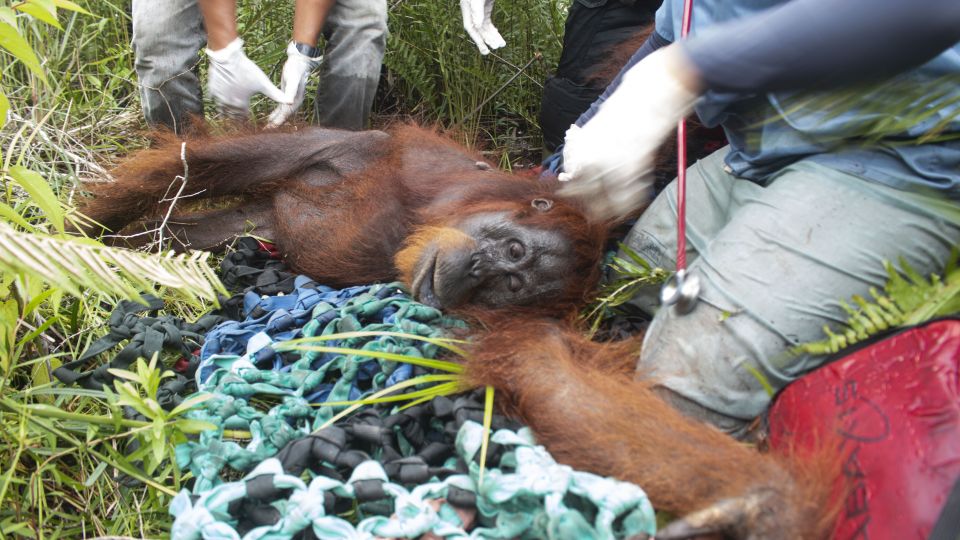
“Forest fires are by far the biggest threat to orangutans in the area where we work in Indonesia,” said Karmele L Sanchez, Director of IAR Indonesia. “Losing forests on this scale means there is no longer enough space for orangutans to survive.
Rescuing them is always the last resort but sometimes that is the only choice we have because we can’t leave them in the remnants of trees that have been destroyed by fire with no shelter and no food. For the sake of all the remaining orangutan populations, we must continue to work very hard to protect their habitat from fires.”
Sadtata Noor Adirahmanta, Head of West Kalimantan BKSDA, said: “Destruction of animal habitats will ultimately affect animals and people because of increasing human/wildlife conflict. Rescue operations are only a small action, indeed a very small one, compared to the steps and policies that should be taken in the future. Concern for the existence and preservation of animals is a responsibility that must be shared by the government, stakeholders and the community. And essentially caring for wildlife is for the good of humans themselves.”
Alan Knight OBE, IAR Chief Executive, said: “The sight of those three orangutans stranded in the remnants of the burnt forest just sums up the desperate plight of the species. Time is running out for orangutans. We must all do as much as we can to protect and preserve them if we want to avoid losing them forever. And we must do it now. Not next month or even next week, but right now!”

